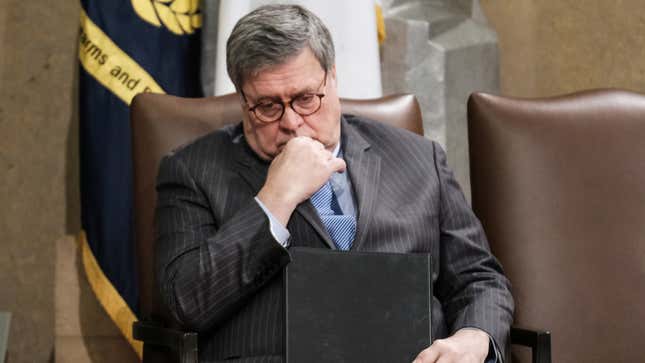
The U.S. Justice Department is hosting a workshop next month seeking “a wide diversity of viewpoints” on Section 230 of the Communications Decency Act, the federal statute that, with few exceptions, protections major internet companies and private website owners from liability when it comes to the posts and comments generated by users.
The Information’s Ashley Gold first reported the DOJ’s plans on Friday after reportedly viewing an invitation for the event.
Use of the phrase “a wide diversity of viewpoints” is somewhat ironic. Section 230 was passed, in part, because lawmakers believed the internet allowed for a “a true diversity of political discourse,” among other reasons. But mostly, they didn’t want internet companies getting sued out of existence over the content that their users create—even if the company took steps to moderate that content to conform with policies to curb abuse.
Over the last couple years, a handful of conservative figures, including Republican Sen. Josh Hawley, have sought to twist the meaning of “true diversity of political discourse” to mean that websites such as Facebook have a legal responsibility to remain “politically neutral” in the curation and moderation of user content.
In reality, the law says nothing of the kind; diversity and neutrality being different, if not totally unrelated, concepts.
Nevertheless, Hawley has accused Facebook and Twitter of separately conspiring to suppress conservative voices—an allegation for which the people throwing stones have offered very little proof, beyond a handful of individual accounts getting banned or suspended temporarily.
As Gizmodo’s Bryan Menegus pointed out last year, most of the high profile suspensions of politically active Twitter accounts, for example, have been directly tied to specific policy violations: “threats, inciting violence, or other abuses.” In many cases, he notes, the hammer only comes down after repeated abuses. Accounts run by prominent figures espousing left-wing viewpoints have not been spared.
“For instance: Jacob Wohl and the Krassenstein brothers, opposite sides of the grifter coin, were both banned not for spouting off unhinged bullshit about how great/horrible Donald Trump is, but because both of them were operating fake accounts on the side,” Menegus wrote.
In a press release last year, Hawley’s office declared: “Section 230 provides tech companies with immunity for illegal content posted by third parties because they provide ‘a forum for true diversity of political discourse.’”
None of that is true.
Section 230 does not provide “immunity” for “illegal content,” as Hawley suggests. In fact, Section 230(e) of the statute states that nothing in the section “shall be construed to impair the enforcement” of laws established in other sections of the Communication Decency Act—such as those protecting children from sexual exploitation—or “any other federal criminal statute.”
More recently, controversial legislation known as FOSTA amended the law further to ensure Section 230 could not be used as defense against in cases involving sex trafficking or prostitution. (FOSTA is currently facing a First Amendment challenge in the case Woodhull Freedom Foundation vs. the United States, which received a go-ahead from the D.C. Circuit on Friday.)
Hawley—who trumpeted his bill last year during a speech at the White House to the praise of President Trump and senior administration officials—further tries to portray “diversity of political discourse” as something Section 230 requires internet companies to foster in exchange for its limited liability protection. It doesn’t.
A government demand forcing the private owner of a website to encourage, restrict, or even allow for political discourse of any kind would seem an obvious violation of the owner’s First Amendment rights. Hopefully someone at the Justice Department knows that.